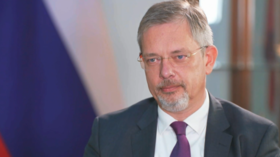US seeks to undermine India-Russia relations – envoy

Russia and India are expanding their economic ties to unprecedented levels, propelling Moscow into the list of New Delhi's top five trade partners, Russian Ambassador to India Denis Alipov has said.
In an article for the Russian newspaper Vedomosti on Monday, he noted that trade with India reached $49 billion last year, with cooperation developing in the railway sector, energy, chemical production, heavy machinery, mining, and agriculture. “All of this is happening despite the desperate attempts by Western countries to isolate Russia," the diplomat noted.
There are “no problems of a fundamental nature” in Russian-Indian relations, the envoy said, adding that current difficulties are mainly due to Western sanctions against Moscow.
“The most vulnerable areas are finance and transportation, but we maintain dialogue in these areas. Among the priority tasks are the development of alternative logistics routes, and new paths for banking and insurance support with an emphasis on the use of national currency,” Alipov noted.
Moscow, however, does not view its interaction with India from a competitive perspective, he stressed.
“Our relations are self-sufficient, positive in nature, and not directed against anyone, which cannot be said about the actions of the United States, which shapes its policy on the principle of opposing 'undesirable countries',” Alipov argued, insisting that the US “openly aims” to undermine India's relations with Russia.
“They continue to apply the same old approach, seeking to reshape the architecture of regional security in the Asia-Pacific region to fit their own standards."
“Our Indian friends are not falling for such maneuvers, they are demonstrating an unequivocal priority to preserve strategic autonomy and protect national interests,” the ambassador said.
Alipov suggested that the key to strengthening the Russia-India partnership lies in “shared positions on fundamental issues of global politics”, and building a fairer and more sustainable world order based on multipolarity, sovereign equality of states, a balance of interests, and the observance of international law, “without double standards and the imposition of unilateral approaches”.
The envoy pointed out that both countries share the goal of reducing reliance on the dollar and euro in international transactions, with India gradually switching to trade in national currencies with its partners.
The diplomat hailed India as a “growing global power, playing a constructive and increasingly noticeable role in international affairs” and lauded the country's rapid economic growth, which could see it jump from fifth to fourth spot among leading economies, surpassing Germany by 2027, according to IMF projections.
India's presidency of the G20 and Shanghai Cooperation Organization in 2023 have presented a valuable opportunity for New Delhi to offer the global community “priority directions” for collaboration in balanced economic recovery, sustainable development, democratization of global governance, and the reform of multilateral financial institutions, Alipov said, noting that these initiatives are supported by other countries of the Global South.
Alipov praised Prime Minister Narendra Modi's government for its focus on developing India's economic potential and establishing the country as a global manufacturing hub, including in promising areas such as electronics, semiconductors, drones, and green energy. “A robust domestic market, combined with efforts to create favorable business conditions, contributes to attracting foreign investment, primarily for infrastructure modernization,” the diplomat asserted.
In the 2022-2023 fiscal year, Indian exports reached $770 billion, representing growth of 13.8%, Alipov said, noting that New Delhi currently has 13 free trade agreements and several preferential trade agreements, and is working on similar arrangements with two dozen other countries. Russia is also ready to initiate negotiations on a free trade zone between India and the Eurasian Economic Union, he emphasized.
Underscoring the historical role of the former USSR in India's industrialization, which laid the groundwork for key sectors including metallurgy, heavy machinery, and energy, while also providing substantial support in science and space exploration, Alipov said: “This perception persists today, and we actively sustain it, fostering an all-encompassing, particularly privileged strategic partnership. Current sociological surveys among Indian youth characterize our country as their most reliable Indian partner."













